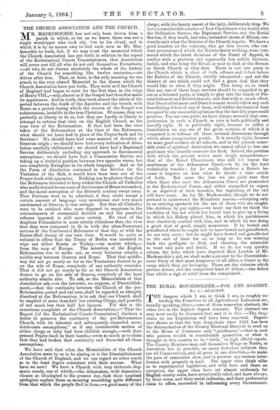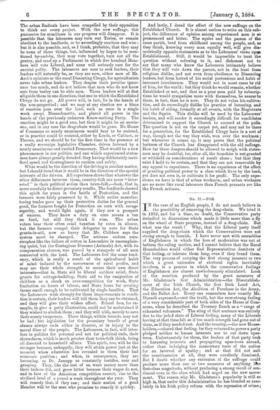THE RURAL HOUSEHOLDER.—FOR AND AGAINST. No. 1.—AGAINST.
THE dangers which I see, or think I see, in roughly ex- tending the Franchise to all Agricultural Labourers are, broadly speaking, three,—one of them somewhat abstract, the other two in the highest degree concrete. The abstract one may most easily be discussed first, and it is this :—The drag- chain on our Legislation will have been removed. Experi- ence shows us that the true drag-chain since 1831 has been the determination of the County Electoral Districts to send up to the House of Commons only " gentlemen,"—that is, men who possess wealth in considerable quantities, or what is thought in this country to be " birth," or high official repute. The County Members may call themselves Whigs or Tories, at discretion, but in practice, on many first-class subjects they are all Conservatives, and all press in one direction,—to make the pace of innovation slow, and to prevent any serious inter- ference with property in land. The upper class think alike as to experimental legislation, and with here and there an exception, the upper class have sat almost uniformly for English county seats, have occasionally ruled, and have always, by their votes, and their social influence, and their preferential claim to office, succeeded in influencing every Government.
The urban Radicals have been compelled by their opposition to think out every project. With the new suffrage, this guarantee for steadiness in our progress will disappear. It is passible that the labourers may turn out Tories, or remain obedient to the landlords, or be exceedingly cautious and wise ; but it is also possible, and, as I think, probable, that they may be none of these things. but, influenced by hopes to be men- tioned by-and-by, they may vote together, turn out all the gentry, and send up a Parliament in which five hundred Mem- bers will vote Liberal, and none will seriously care for the ancient polity. The labourers are sure to seek leaders, their leaders will naturally be, as they are now, either men of Mr. Arch's opinions or the rural Dissenting Clergy, for agriculturists never take urban leaders. They despise their peculiar ignor- ance too much, and do not believe that men who do not know oats from barley can be able men. These leaders will at first all guide them in one direction, that one in which the Established Clergy do not go. All power will, in fact, lie in the hands of the non-propertied ; and we may at any election see a blaze of emotion pass over the land, such as once in a single week swept Massachusetts, and placed all power in the hands of the previously unknown Know-nothing Party. The emotion might be a good one, but then it might be an unwise one, and in any case the drag-chain would be gone. No House of Commons so nearly unanimous would bear to be resisted, or in practice could be resisted, either by Lords, or Cabinet, or Throne, and we should be for the first time in the presence of a really sovereign legislative Chamber, driven forward by a nearly unanimous and excited Democracy. That would be a new phenomenon in our politics, and one which experienced states- men have always greatly dreaded, they having deliberately sacri- ficed speed and thoroughness to caution and safety.
What would be the direction of the driving is another matter, but I should dread that it would be in the direction of the special interests of the drivers. All experience shows that whatever the other differences between them, country-folk are more " inter- ested " in their political action than town-folk,—look, that is, more carefully to direct pecuniary results. The landlords showed this spirit for years in the battle of ProtectiOn, and the farmers were fairly possessed by it. While entire manufac- turing trades gave up their protective duties for the general good, the farmers fought for Protection on corn with savage asperity, and would fight again, if they saw a prospect of (success. They know a duty on corn means a tax on food, but still they think it wise. The urban voters bear their often cruel taxation by rates in silence, but the farmers compel their delegates to vote for State grants-in-aid, now so heavy that Mr. Childers says the system must be changed. The artisans endure cata- strophes like the failure of cotton in Lancashire in uncomplain- ing quiet, but the Contagious Diseases (Animals) Act, with its compensation clauses, was passed by a stampede of all men connected with the ;and. The Labourers feel the same tend- ency, which is really a result of the agricultural habit of mind induced by the narrowness of rural profits, and may use their whole strength to secure their own direct intereets—that is, State aid to liberal outdoor relief, State grants for cottage-building, State aid to the emigration of children as a check on over-competition for work, State limitation on hours of labour, and State loans for creating farms small enough to be cultivated by single families. That the Labourers wish strongly for these improvements in condi- tion is certain, their leaders will tell them they can be obtained, and they will give their wishes effect. School fees, for ex- ample, to give a petty illustration, could not be maintained if they wished to abolish them ; and they will wish, merely to save their scanty twopences. These things, within bounds, may not be bad ; but legislation for the pecuniary benefit of great classes always ends either in disaster, or in injury to the moral fibre of the people. The Labourers, in fact, will inter- fere in politics for personal and not for political ends, their shrewdness, which is much greater than town-folk think, being all directed to household affairs. This spirit, too, will be the stronger because, unhappily, they will attain power just at the moment when education has revealed to them their bad economic position ; and when, in consequence, they are becoming, as Dr. Jessopp so constantly testifies, sour and grasping. They, like the rest of us, want money more than their fathers did, and grow bitter because their wages do not, and in face of the American competition cannot, rise to the civilised level of a pound a week throughout the year. They will remedy that, if they can ; and their notion of a good Member will be the man who promises to remedy it quickly. And lastly, I dread the effect of the new suffrage on the Established Church. It is almost useless to write on this sub- ject, the difference of opinion among experienced men is so pronounced and bitter. The squire and the parson of the same parish, bred from childhood among the people, and, as they think, knowing every man equally well, will give dia- metrically opposite statements as to the Labourers' views twist Establishment. Still, it would be impossible to treat the question without referring to it, and dishonest not to say that many who know the Labourers intimately believe that they will vote down the parson, not in the least from religious dislike, and not even from obedience to Dissenting leaders, but from hatred of his social pretensions and habit of incessant interference. They would not in most cases be rid of him, for the world ; but they think he would remain, whether Established or not, and that as a poor man paid by subscrip- tions he would sympathise more with themselves, be nearer to them, in fact, Than he is now. They do not value his cultiva- tion, and do exceedingly dislike his practice of lecturing, and his habit of siding, formally at all events, with the Magistrate and the Squire. This dislike will be used by the Labourers' leaders, and will render it exceedingly difficult for candidates determined to support the Church to succeed at the polls. The question is not on the carpet yet, and may not be there for a generation, for the Established Clergy have in a sort of way, though not the way they wish, won over the workmen ; but whenever it comes up, it may prove that the political buttress of the Church has disappeared with the old suffrage. How far these dangers should be allowed to weigh with states- men may be doubtful, for, after all, the franchise is not granted or withheld on considerations of result alone ; but that they exist I hold to be certain, and that they are not removable by any appeal to experience. There is no experience of the effect of granting political power to a class which lives by the land, yet does not own it, or cultivate it for profit. The only expe- rience we have is that of urban workmen, and urban workmen are no more like rural labourers than French peasants are like the French artisans.







































 Previous page
Previous page